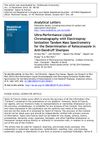 June 2007 in “Journal of Investigative Dermatology”
June 2007 in “Journal of Investigative Dermatology” Title change to "Central Centrifugal Cicatricial Alopecia (CCCA)"; common in African American women; hair-grooming methods may contribute; no effective therapy found; trials needed.
 11 citations,
December 2006 in “Expert Review of Dermatology”
11 citations,
December 2006 in “Expert Review of Dermatology” Dermoscopy is becoming essential for diagnosing skin conditions and is expected to be a standard tool for dermatologists.
 1 citations,
February 2004
1 citations,
February 2004 Skin diseases are common and can significantly affect people's lives; better outcome measures and ethical clinical trials are needed to improve dermatology care.
[object Object]  2 citations,
July 2015 in “Biochemical Systematics and Ecology”
2 citations,
July 2015 in “Biochemical Systematics and Ecology” Different types of Armillaria fungus have a high genetic variety when partnering with Polyporus umbellatus mushrooms in China.
 78 citations,
September 2006 in “International Journal of Cosmetic Science”
78 citations,
September 2006 in “International Journal of Cosmetic Science” Dandruff is mainly caused by a scalp reaction to yeast, can worsen hair loss, and antifungal treatments may help.
 200 citations,
November 1997 in “Planta”
200 citations,
November 1997 in “Planta” Calcium affects where root hairs grow, but other unknown factors determine their growth direction.
 3 citations,
January 2012 in “Elsevier eBooks”
3 citations,
January 2012 in “Elsevier eBooks” The document says that there are treatments for hair and nail diseases.
 6 citations,
April 2023 in “Frontiers in plant science”
6 citations,
April 2023 in “Frontiers in plant science” Certain bacteria can boost lentil growth and improve soil used for farming.
 May 2024 in “Journal of cosmetic dermatology”
May 2024 in “Journal of cosmetic dermatology” Heat-treated Limosilactobacillus fermentum with menthol, salicylic acid, and panthenol promotes hair growth and balances scalp microbiome in people with androgenetic alopecia.
 March 2010 in “Anti-inflammatory & anti-allergy agents in medicinal chemistry”
March 2010 in “Anti-inflammatory & anti-allergy agents in medicinal chemistry” Biologic agents can be effective for rheumatic diseases but have risks like infections and require careful monitoring and patient information.
 27 citations,
December 2015 in “Mayo Clinic Proceedings”
27 citations,
December 2015 in “Mayo Clinic Proceedings” The document concludes that lifestyle changes and medical treatments can significantly reduce symptoms of Hidradenitis Suppurativa, a chronic skin condition.
[object Object]  January 2023 in “Pesquisa Veterinária Brasileira”
January 2023 in “Pesquisa Veterinária Brasileira” A KRT71 mutation in Hereford cattle in Uruguay causes thin, curly hair and scaly skin.
 2 citations,
April 2021 in “Naukovì gorizonti”
2 citations,
April 2021 in “Naukovì gorizonti” Effective treatment significantly improves pododermatitis in dogs, reducing symptoms and extending remission.
 July 2024 in “Journal of Investigative Dermatology”
July 2024 in “Journal of Investigative Dermatology” A single medium, PRIME AIRLIFT, supports better human hair follicle formation in grafts.
 February 2024 in “International Journal For Multidisciplinary Research”
February 2024 in “International Journal For Multidisciplinary Research” The herbal hair oil with natural extracts can improve hair health and reduce dandruff.
 8 citations,
February 2005 in “Veterinary dermatology”
8 citations,
February 2005 in “Veterinary dermatology” Chesapeake Bay retrievers' hair loss is likely a breed-specific, hereditary condition linked to abnormal steroid levels and distinct skin changes.
 84 citations,
April 2005 in “Dermatologic Clinics”
84 citations,
April 2005 in “Dermatologic Clinics” Treatments for melanin disorders exist, but more effective options needed.
 1 citations,
February 2014 in “Analytical Letters”
1 citations,
February 2014 in “Analytical Letters” The method accurately measures the amount of ketoconazole in anti-dandruff shampoo and cream, and can also be used to monitor the drug in human plasma.
 8 citations,
May 2018 in “Primary Care: Clinics in Office Practice”
8 citations,
May 2018 in “Primary Care: Clinics in Office Practice” Doctors should use a detailed patient history and physical exam to diagnose joint pain, and consult a rheumatologist early for suspected autoimmune diseases.
 33 citations,
March 2017 in “Dermatologic Surgery”
33 citations,
March 2017 in “Dermatologic Surgery” Low-level laser therapy effectively treats female hair loss, increasing hair count by 51%.
 November 2015 in “Clin-Alert”
November 2015 in “Clin-Alert” Some medications and supplements can cause serious side effects, including hair loss, heart rhythm problems, liver injury, and other health issues.
 3 citations,
January 2018 in “İstanbul Kuzey Klinikleri”
3 citations,
January 2018 in “İstanbul Kuzey Klinikleri” Hair loss was found in 37.4% of surveyed rural high-school students in Eskisehir, Turkey, affecting their quality of life, especially in general health and mental well-being.
 30 citations,
February 2018 in “Journal of Pharmacy and Pharmacology”
30 citations,
February 2018 in “Journal of Pharmacy and Pharmacology” Hedychium spicatum has medicinal properties but needs more research for scientific validation and use.
 February 2008 in “Expert Review of Dermatology”
February 2008 in “Expert Review of Dermatology” Seborrheic dermatitis significantly lowers quality of life, especially in young people, women, and those with higher education.
 January 2021 in “Nasza Dermatologia Online”
January 2021 in “Nasza Dermatologia Online” Plica polonica is a rare condition where hair becomes irreversibly tangled, and the treatment is to cut the matted hair.
 55 citations,
November 2004 in “Expert opinion on drug safety”
55 citations,
November 2004 in “Expert opinion on drug safety” Chemotherapy often causes hair loss, nail changes, and mouth issues, but these are usually manageable.
 10 citations,
October 2015 in “Journal of the International Association of Providers of AIDS Care”
10 citations,
October 2015 in “Journal of the International Association of Providers of AIDS Care” A woman with HIV had a severe skin condition that improved with antiretroviral therapy.
 165 citations,
January 2014 in “Dermatology Research and Practice”
165 citations,
January 2014 in “Dermatology Research and Practice” Zinc is effective for treating various skin conditions, including warts and acne.
 19 citations,
August 2007 in “Seminars in Plastic Surgery”
19 citations,
August 2007 in “Seminars in Plastic Surgery” Newer skin resurfacing lasers reduce damage and scarring, with some approved for safe use and minimal side effects.
2 citations,
October 2015 in “Mikrobiyoloji bülteni” A woman in Turkey with a scalp infection was cured using oral and topical antifungals after a recurrence due to not following the treatment properly.




























